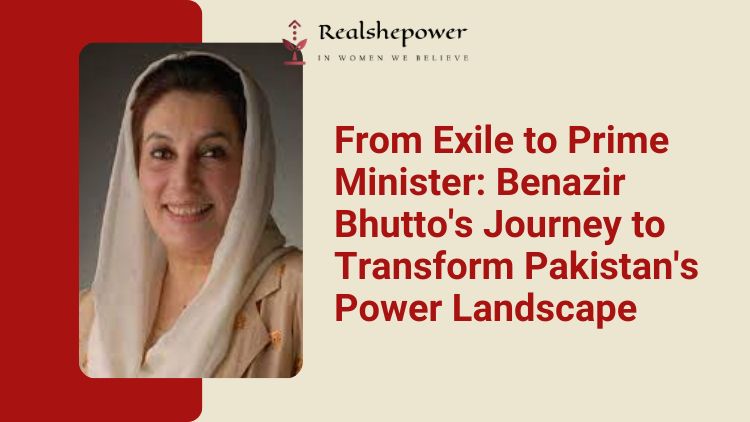Beneath the Crescent and the Sindhi Sari: Benazir Bhutto’s Unbowed Flame in Pakistan’s Turbulent Tapestry


Summary: This article explores the multifaceted legacy of Benazir Bhutto, highlighting her rise to power as the first female Prime Minister of a Muslim-majority nation, her fight for democracy and social justice, her complex political challenges, and the enduring impact of her unbowed spirit on Pakistan’s ongoing struggle for a more equitable future.
In the heart of Pakistan, where ancient Indus whispers collide with the call to prayer, lies a story woven with threads of defiance, tragedy, and a flicker of unwavering hope. It’s the saga of Benazir Bhutto, the woman who became the first female Prime Minister of a Muslim-majority nation, lighting a fire that continues to cast long shadows across Pakistan’s complex political landscape.
Born in 1953, Bhutto was destined for a life intertwined with power. Daughter of Zulfikar Ali Bhutto, Pakistan’s Prime Minister, she inherited a legacy etched in both privilege and political turmoil. The cruel hand of fate snatched her father through a military coup when she was barely 26, leaving her to navigate a desolate wasteland of grief and exile.
Key Takeaways:
- Bhutto’s story is a tapestry of defiance, political turmoil, and unfulfilled promises, prompting analysis of her legacy beyond simplistic hero or villain narratives.
- Her fight for democracy and women’s empowerment ignited hope for millions, pushing Pakistan to confront its internal challenges.
- Bhutto’s legacy lives on in the hearts of those who continue to strive for a more just and equitable future in Pakistan.
But Bhutto was not built to succumb. The Sindhi sun had kissed her spirit with resilience, the echoes of her father’s fiery speeches etched in her heart. Oxford and Harvard became her battlegrounds, honing her intellect and amplifying her voice. She returned to a Pakistan simmering with discontent, her fiery charisma igniting the embers of rebellion against the iron-fisted Zia regime.
The People’s Party, her father’s legacy, became her chariot. Her speeches, a potent blend of Urdu poetry and revolutionary zeal, resonated with millions yearning for democracy and social justice. The “daughter of the East,” as she was fondly called, became a symbol of hope, her emerald green dupatta a banner of defiance against the khaki-clad establishment.
In 1988, Pakistan’s fragile democracy flickered back to life. Bhutto, at 35, became the youngest Prime Minister in the Islamic world, a beacon of change casting its light across a nation yearning for progress. But the ascent was fraught with perils. The shadows of political rivalry danced with whispers of corruption, her tenure punctuated by dismissals and reinstatements, each round a grueling test of her resilience.
Bhutto’s fight wasn’t confined to the halls of power. She championed women’s empowerment, her own vibrant presence challenging centuries of patriarchal norms. She tackled poverty and illiteracy, spearheading social reforms that rippled through the heartland. Yet, critics whispered of unfulfilled promises, the harsh realities of political maneuverings eclipsing the glimmer of her revolutionary spirit.
Tragedy, again, cast a long shadow. In 2007, a suicide bomber extinguished the flame that seemed destined to burn bright. Bhutto’s assassination ripped through the nation, leaving behind a legacy as complex and enigmatic as the woman herself.
Was she a flawed hero, burdened by the weight of expectation? Or a revolutionary martyr, silenced in the twilight of a nation’s struggle? Perhaps the answer lies not in absolutes, but in the echoes of her defiance. Bhutto shattered glass ceilings, ignited the hopes of millions, and forced Pakistan to confront its demons.
Her unbowed flame, though flickering in the wind of political turmoil, continues to inspire generations of activists and changemakers. The daughter of the East may be gone, but her legacy lives on in the hearts of countless Pakistanis who still yearn for a democracy rooted in justice, equality, and the unwavering spirit of a woman who dared to dream beneath the crescent and the Sindhi sari.
Bhutto’s story is not a finished script, but a chapter in an ongoing saga. Her complexities, her triumphs and failures, are threads woven into the tapestry of Pakistan’s evolving democracy. It is a story that compels us to grapple with the messy realities of political change, to celebrate the audacity of hope, and to remember that even the flicker of a single flame can illuminate the path towards a more just and equitable future.
So, let us honor the memory of Benazir Bhutto not just with solemn pronouncements, but with action. Let her courage ignite our own, her defiance fuel our resolve. Let us pick up the torch she carried, and march towards a Pakistan where the daughters of the East rise not just to become Prime Ministers, but architects of a future where democracy breathes freely, and the flames of hope burn bright, undimmed by the shadows of the past.
